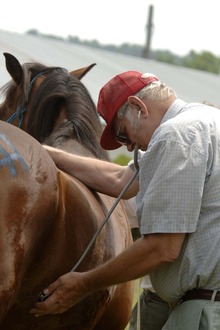Meg Green, DVM, Manager, Merial Large Animal Veterinary Services, responds to a question about equine stomach ulcers: Q. I have several young horses in my care that aren’t in training yet. Is it possible for them to get equine stomach ulcers?

Vet doing a horse colic check
Unfortunately, even though young horses generally aren't exposed to stressful activities, they can develop stomach ulcers and the presence of ulcers in foals has been reported as ranging between 25 percent and 51 percent.
© 2013 by Carien Schippers
A. You’re smart to ask that question. We often think our young horses are immune to equine stomach ulcers because they aren’t exposed to the stressors that we know can contribute to the development of ulcers. Those stressors are more often associated with the kinds of activities we do with actively competing horses such as training, traveling and trailering.1
Unfortunately, even though young horses generally aren’t exposed to stressful activities, they can develop stomach ulcers. In fact, the presence of ulcers in foals has been reported as ranging between 25 percent2 and 51 percent.
Part of what contributes to the development of ulcers in such young horses is the functioning of the stomach itself. A horse’s stomach secretes acid 24 hours a day, seven days a week. Foals have been documented to secrete gastric acid as early as two-days of age.4 When the acid builds up in the stomach, it can lead to the development of ulcers, regardless of the foal’s or adult horse’s age.
Diagnosing ulcers in a horse or foal can be done conclusively with the use of an endoscope. However, a presumptive diagnosis can also be made based on clinical signs, which can include teeth-grinding, salivation, interrupted nursing and colic.5 However, these signs have only been observed in a minority of foals.5
Besides the build up of acid possibly leading to ulcers, all foals undergo the stressful6 process of weaning, usually between four and six months of age.6 That stress can contribute to the formation of ulcers.
Should you suspect your foal or young horse has ulcers, consult a veterinarian. He or she will determine, based on the clinical signs, what course of action to recommend. For the treatment of ulcers in foals over four weeks of age, your veterinarian should prescribe GASTROGARD® (omeprazole). The active ingredient, omeprazole, works to suppress acid secretion.7
To prevent ulcers from developing during time of stress, use ULCERGARD® (omeprazole) on horses that weigh at least 600 pounds.
Both GASTROGARD and ULCERGARD are FDA-approved and proven drugs, which means they have gone through rigorous testing to ensure their safety and efficacy.8
Before giving your horse any medication, you should be sure it meets these standards. You can do that by using the FDA’s searchable database at AnimalDrugs@fda.
Meg Green, DVM, is a member of the Merial Veterinary Professional Services Team.
Dr. Green is certified in equine acupuncture and has expertise in equine internal medicine and ambulatory medicine. She has worked with broodmares, foals, performance and racehorses. Dr. Green has practiced in Alabama and Kentucky, and continues to practice in Georgia and Tennessee when time allows. She earned her doctor of veterinary medicine from Tuskegee University School of Veterinary Medicine.
About Merial
Merial is a world-leading, innovation-driven animal health company, providing a comprehensive range of products to enhance the health, well-being and performance of a wide range of animals. Merial employs approximately 6,000 people and operates in more than 150 countries worldwide. Its 2012 sales were $2.8 billion.
IMPORTANT SAFETY INFORMATION
Caution: Safety of GASTROGARD in pregnant or lactating mares has not been determined.
ULCERGARD can be used in horses that weigh at least 600 pounds. Safety in pregnant mares has not been determined.
®ULCERGARD and GASTROGARD are registered trademarks of Merial. ©2013 Merial Limited, Duluth, GA. All rights reserved. EQUIUGD1326 (06/13)
1ULCERGARD product label.
2Murray MJ, Hart J, Parker GA. Equine gastric ulcer syndrome: endoscopic survey of asymptomatic foals, in Proceedings. Am Assoc Equine Pract 1987;769-776.
3Wilson JH. Gastric and duodenal ulcers in foals: a retrospective study, in Proceedings. 2nd Equine Colic Res Symp 1986;126-129.
4Andrews, F. Gastric ulcers in foals and adult horses, in Proceedings. 2001 Alberta Horse Owners and Breeders Conference. Available at: www1.agric.gov.ab.ca/$department/deptdocs.nsf/all/hrs3712. Accessed June 12, 2013.
5Murray MJ. Diagnosing and treating gastric ulcers in foals and horses, Vet Med August 1991;820-827.
6Meadows DG, Henton JE. Weaning management for foals, Equifacts. The University of Tennessee. Agricultural Extension Service. Available at: http://utextension.tennessee.edu/publications/documents/TNH3004.pdf. Accessed June 12, 2013.
7GASTROGARD product label.
8Animal Health Institute and American Veterinary Medical Association and American Veterinary Distributors Association. Veterinary Compounding. Available at: http://www.aaep.org/siteadmin/modules/page_editor/images/files/AHI%20Compounding.pdf. Accessed June 12, 2013.
